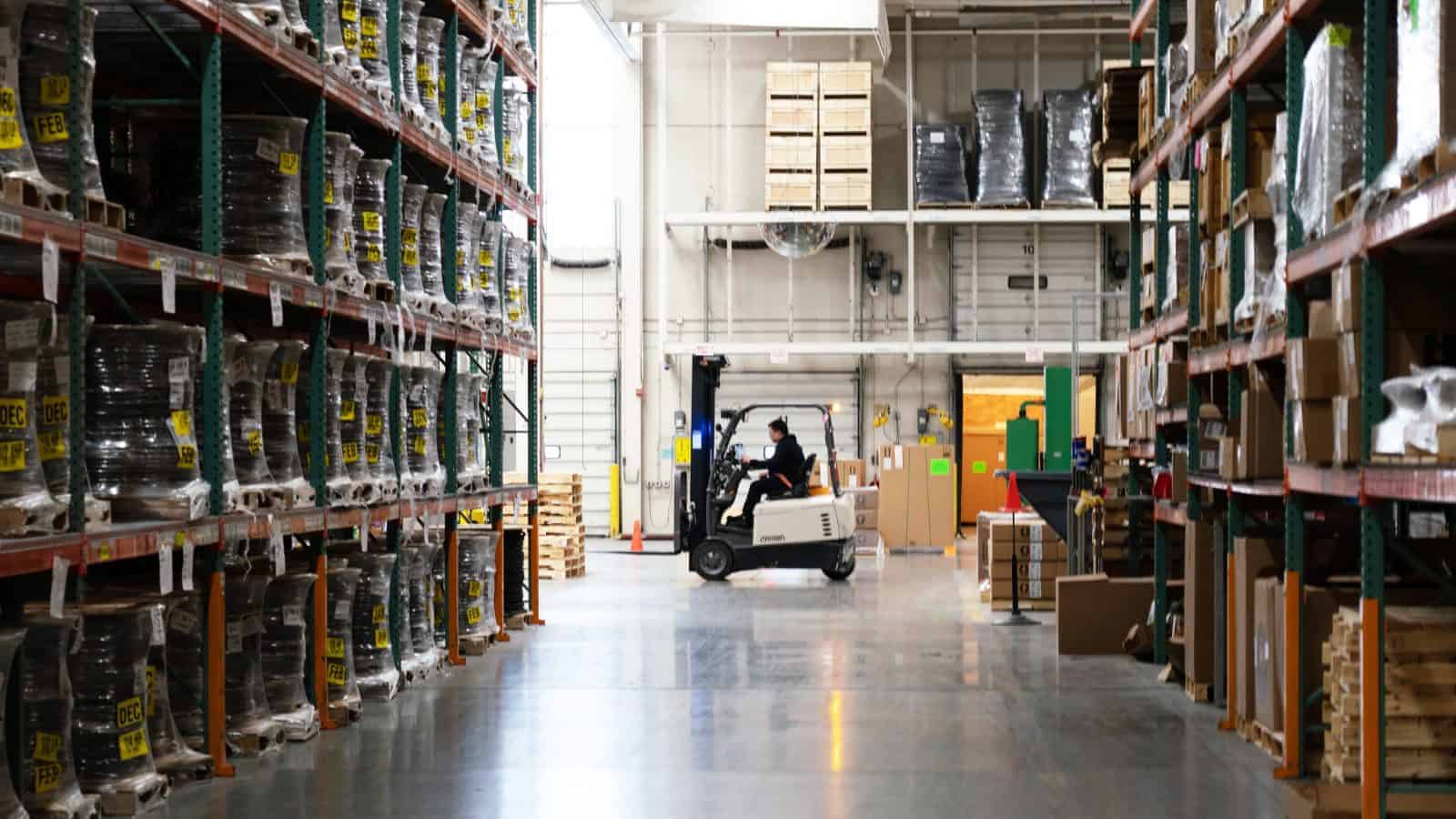Manufacturers Back Chips Bill, Call for Further Action from Congress
Timmons: “A vote for the CHIPS Act funding is a vote for a stronger, more competitive manufacturing industry in America.”
Washington, D.C. – Ahead of consideration of legislation to bolster U.S. semiconductor manufacturing, National Association of Manufacturers President and CEO Jay Timmons released the following statement:
“A vote for the CHIPS Act funding is a vote for a stronger, more competitive manufacturing industry in America. But if Congress fails to pass this investment in the coming days, they will hand other countries a competitive advantage and weaken our own economy at a precarious moment.
“Other provisions of the China competition bill still under negotiation also need to make it to the president’s desk, and manufacturers firmly support their inclusion in this package. We will continue our advocacy for the anti-counterfeiting measures, trade provisions, supply chain investments and more. Congress must get those done.
“This week, we can take a powerful step forward with chips funding and move toward a future where semiconductor shortages—and the disruptions they’ve created—are a thing of the past. Other nations are not waiting around to ramp up semiconductor manufacturing. America should be leading, not falling behind.”
Background:
According to the NAM’s latest Manufacturers’ Outlook Survey, more than 88% of respondents said it was important for the federal government to take steps to support the domestic manufacturing sector in the face of increased global competition for industrial investment, with nearly 58% saying “very important” and 30.7% saying “somewhat important.” When asked about what aspects of the China competition legislation were most important for supporting manufacturing activity, the top choices were addressing port congestion and competition issues in ocean shipping (70.9%), eliminating ill-conceived labor provisions that facilitate unionization campaigns (61.3%), strengthening U.S. leadership in energy innovation and competitiveness (58.2%), funding to increase domestic semiconductor production capacity (57.9%), investments to support the critical minerals supply chain (55.7%) and ensuring the tax code provides a full deduction for research expenses (48.3%), among others.
-NAM-
The National Association of Manufacturers is the largest manufacturing association in the United States, representing small and large manufacturers in every industrial sector and in all 50 states. Manufacturing employs more than 12.8 million men and women, contributes $2.77 trillion to the U.S. economy annually and accounts for 58% of private-sector research and development. The NAM is the powerful voice of the manufacturing community and the leading advocate for a policy agenda that helps manufacturers compete in the global economy and create jobs across the United States. For more information about the NAM or to follow us on Twitter and Facebook, please visit www.nam.org.
North American Manufacturing Industry Statement on the Two-Year Anniversary of the United States–Mexico–Canada Agreement
Washington, D.C. – The leading organizations representing manufacturers and millions of manufacturing workers in the United States, Mexico and Canada released the following statement on the two-year anniversary of the United States–Mexico–Canada Agreement (USMCA/T-MEC/CUSMA):
“On this two-year anniversary, we recognize the substantial value that this agreement and the North American Free Trade Agreement have represented for our industry’s competitiveness, our economies and North American workers. Manufacturing is critical for the entire North American economy. Our closely integrated supply chains contribute more than $3 trillion annually to the North American economy, and more than $2 billion worth of manufactured goods cross our borders each day.
“The USMCA can only reach its full potential if it is fully implemented in a manner that upholds its letter and spirit. That is why manufacturers across North America continue to strongly and respectfully urge political leaders to work together to live up to the commitments of the agreement, which garnered broad support in all three countries. Full compliance with the agreement will provide certainty for the more than 23 million manufacturing workers in the United States, Mexico and Canada and boost our region’s ability to compete with the rest of the world.
“The Canadian Manufacturers & Exporters (CME), the Confederation of Industrial Chambers of Mexico (CONCAMIN) and the National Association of Manufacturers (NAM) reiterate our longstanding commitment to engage with the Canadian, Mexican and U.S. governments to ensure that the USMCA/T-MEC/CUSMA is fully implemented and that it supports our industry’s competitiveness and our workers at this critical time for our economies.”
Background: Earlier this week NAM President and CEO Jay Timmons wrote to President Biden about certain challenges in U.S.-Mexico trade relations.
-NAM-
The National Association of Manufacturers is the largest manufacturing association in the United States, representing small and large manufacturers in every industrial sector and in all 50 states. Manufacturing employs more than 12.7 million men and women, contributes $2.71 trillion to the U.S. economy annually and accounts for 58% of private-sector research and development. The NAM is the powerful voice of the manufacturing community and the leading advocate for a policy agenda that helps manufacturers compete in the global economy and create jobs across the United States.
-CME-
Canadian Manufacturers & Exporters (CME) is Canada’s largest trade and industry association, and the voice of manufacturing and global business in Canada. CME directly represents more than 10,000 leading companies nationwide. As Canada’s leading business network, CME – through various initiatives, including the establishment of the Canadian Manufacturing Coalition – touches more than 100,000 companies from coast to coast, engaged in manufacturing, global business, and service-related industries.
-CONCAMIN-
The Confederation of Industrial Chambers of the United Mexican States, CONCAMIN, established in 1918, is the main organization representing the different industrial sectors and activities of high importance for the economic development of Mexico. The National Confederation of Industrial Chambers, is by law a mandatory consultative body of the State since its creation 104 years ago, it represents 118 Chambers and Associations.
It generates 48 out of every 100 formal jobs in the country. Through 1.2 million Economic Units, we contribute 40% of the GDP and 90% of the country’s exports.
New Study: Ports Stoppage Would Be Devastating Hit to Manufacturers’ Competitiveness
Cost Economy Half a Billion Dollars a Day, Destroy 41,000 U.S. Jobs
Washington, D.C. – As negotiations between the Pacific Maritime Association and International Longshore and Warehouse Union near a critical deadline, manufacturers are sounding the alarm about potential economic consequences of a port stoppage if disruption were to occur over two weeks at the ports of Los Angeles and Long Beach, the nation’s largest port complex. According to a study by Inforum Economics, a 15-day disruption would cost the U.S. economy nearly half a billion dollars a day—for a total of $7.5 billion—and destroy 41,000 jobs, including more than 6,100 in manufacturing.
As the industry continues to grapple with historic supply chain challenges, inflationary pressures and rising transportation and energy costs, manufacturers are calling on the parties to reach an agreement immediately to avoid this continued uncertainty.
“The ports of Los Angeles and Long Beach support a major share of cargo relied upon by American businesses and consumers, supporting supply chains across the entire country. With supply chains already stretched thin, inflation at its highest level in four decades and concerns of a recession rising, any disruption would mean a devastating hit to our economy and to manufacturers’ competitiveness,” said National Association of Manufacturers President and CEO Jay Timmons. “The disruption would be felt immediately. Manufacturing jobs will be lost if parts and supplies don’t arrive. New equipment, machinery and products can’t be built when ships are backed up and there is no one available to unload and process cargo. Our overseas customers won’t wait for us to fix these disruptions, either—they’ll simply find other suppliers, weakening U.S. manufacturing competitiveness in the process.
“This is why the Pacific Maritime Association and the International Longshore and Warehouse Union must not allow a disruption at these ports. Manufacturers, our millions of employees and the countless others whose lives and livelihoods depend on the products we make are counting on the PMA and the ILWU to reach a resolution and keep the ports running.”
Background: At the time of publication, the PMA and ILWU are engaged in labor negotiations. The NAM commissioned an analysis using the Inforum LIFT economic model to quantify the impacts of a 15-day closure at the Los Angeles and Long Beach ports. Specifically, it estimates how such a closure would impact U.S. employment, output and income. These ports have experienced historic disruptions and bottlenecks since late 2020, and nearly 84% of manufacturers now list freight and transportation costs as a key driver of inflation.
-NAM-
The National Association of Manufacturers is the largest manufacturing association in the United States, representing small and large manufacturers in every industrial sector and in all 50 states. Manufacturing employs more than 12.7 million men and women, contributes $2.71 trillion to the U.S. economy annually and accounts for 58% of private-sector research and development. The NAM is the powerful voice of the manufacturing community and the leading advocate for a policy agenda that helps manufacturers compete in the global economy and create jobs across the United States. For more information about the NAM or to follow us on Twitter and Facebook, please visit www.nam.org.
WTO TRIPS Decision Jeopardizes Pandemic Response, Manufacturing Competitiveness
Washington, D.C. – Following a decision by the World Trade Organization to lift intellectual property protections for COVID-19 products, National Association of Manufacturers President and CEO Jay Timmons released the following statement:
“This damaging decision will undermine American innovation, competitiveness and technology leadership—weakening manufacturing in America and threatening the jobs of manufacturing workers. Even worse, the agreement could exacerbate the supply chain and logistical hurdles that represent the biggest current challenges to global efforts to ensure access to critical COVID-19 products.
“It is alarming and disappointing that the United States would join other countries to give away manufacturers’ innovations to our commercial rivals. Our industry has been on the front lines of efforts to fight COVID-19—developing, manufacturing and distributing vaccines and other essential products needed to save lives and strengthen our economy. American innovation has been at the heart of the manufacturing response to the pandemic and will be just as critical for our ability to lead the world and respond to future global health crises.
“Manufacturers have been vocal supporters of effective solutions at the WTO that leverage trade to fight the pandemic—but this waiver is not one of them. Manufacturers call on the Biden administration to reverse course on this decision and take immediate action to protect this vital technology, American workers and global health.”
-NAM-
The National Association of Manufacturers is the largest manufacturing association in the United States, representing small and large manufacturers in every industrial sector and in all 50 states. Manufacturing employs more than 12.7 million men and women, contributes $2.71 trillion to the U.S. economy annually and accounts for 58% of private-sector research and development. The NAM is the powerful voice of the manufacturing community and the leading advocate for a policy agenda that helps manufacturers compete in the global economy and create jobs across the United States. For more information about the NAM or to follow us on Twitter and Facebook, please visit www.nam.org.
Manufacturers: USTR Report Signals Importance of Concrete Action to Protecting Manufacturing Innovation
Washington, D.C. – Following U.S. Trade Representative Katherine Tai’s release of the agency’s annual Special 301 report on global intellectual property protection, National Association of Manufacturers Vice President of International Economic Affairs Ken Monahan released the following statement:
“Innovation and intellectual property are the lifeblood for manufacturers in the United States, supporting manufacturing businesses and a skilled workforce here at home, creating economic opportunity for Americans of all backgrounds and empowering American leadership around the world. That manufacturing innovation is also a constant target for foreign governments and businesses that want to steal or undermine critical IP protections and rules to boost their own economies at our expense.
“USTR’s latest Special 301 report clearly illustrates many of the biggest IP barriers—and bad actors—that the NAM highlighted in our January 2022 submission to USTR as risks to as risks to our manufacturing businesses and workers. This report is an important step toward concrete action. We urge USTR and other agencies to stand up for innovative manufacturers by knocking down these barriers and by pushing back against those who would weaken critical IP protections around the world.”
-NAM-
The National Association of Manufacturers is the largest manufacturing association in the United States, representing small and large manufacturers in every industrial sector and in all 50 states. Manufacturing employs more than 12.5 million men and women, contributes $2.71 trillion to the U.S. economy annually and accounts for 58% of private-sector research and development. The NAM is the powerful voice of the manufacturing community and the leading advocate for a policy agenda that helps manufacturers compete in the global economy and create jobs across the United States. For more information about the NAM or to follow us on Twitter and Facebook, please visit www.nam.org.
Manufacturers at the Table in U.S.–UK Trade Dialogue

The NAM delivered several key messages to U.S. Trade Representative Katherine Tai this week at the U.S.–UK Dialogue on the Future of Atlantic Trade in Aberdeen, Scotland.
What’s happening: The meetings, convened by Ambassador Tai and UK Secretary of State for International Trade Anne-Marie Trevelyan, were the second in a series begun last month in Baltimore.
- The meetings in Aberdeen featured a series of dialogues on issues including supply chains, digital trade, small- and medium-sized enterprises and green trade.
- They included U.S. and UK government officials as well as U.S. and UK business, labor and civil society leaders.
What the NAM said: NAM Vice President of International Economic Affairs Ken Monahan, who participated in both sets of meetings, told Input that the NAM made two crucial points to Ambassador Tai, Secretary Trevelyan and other leaders this week.
- “Manufacturers in the United States need diverse sources for trade to ensure supply chain resiliency—supported by a robust network of market-opening, comprehensive, enforceable trade agreements and other arrangements with U.S. allies,” Monahan said.
- He added that “as the U.S. and the UK take steps to build a stronger, more open and secure economic relationship, the NAM urged the launch of talks toward a new U.S.–UK market-opening trade agreement that includes strong, clear and enforceable outcomes.”
Monahan also told the leaders that a trade deal with the UK should include several key priorities for manufacturers, including:
- The elimination of tariffs and nontariff barriers;
- Strong digital trade commitments;
- Robust engagement on intellectual property issues;
- Collaboration on standards, technical regulations, testing procedures and conformity assessment;
- The brokering of common approaches to ending forced labor in global supply chains; and
- Ensuring stronger alignment on customs procedures and approaches.
Why it matters: The U.S. and the UK share a strong trade and investment relationship.
- It includes more than $93 billion in two-way trade of manufactured goods and accumulated cross-border investment in manufacturing of more than $273 billion.
- Key U.S.-manufactured goods exports to the UK include metals, chemicals, transportation equipment, computer and electronic products and machinery.
The last word: “Recent events show that we need our friends now more than at any time in recent memory,” Monahan said. “It is vital that we forge deeper trade agreements and other economic partnerships with allies like the UK. It is also essential that we work closely with the UK and others to ensure supply chain resiliency and address shared global economic challenges that our companies face in markets around the world.”
Business Leaders Urge Resolution of U.S.-Canada Border Blockade
The National Association of Manufacturers, U.S. Chamber of Commerce and Business Roundtable today issued the following statement on the disruptions to trade at U.S.-Canada border crossings:
“The disruptions we are seeing at the U.S.-Canada border — at the Detroit-Windsor Ambassador Bridge and at other crossings — are adding to the significant supply chain strains on manufacturers and other businesses in the United States.
“The business community is rolling up its sleeves to find workarounds and keep facilities up and running, but we are already seeing some production cuts, shift reductions, and temporary plant closures. The North American economy relies on our ability to work closely together, including our manufacturing sectors. We need to apply the same spirit of cooperation to tackle this problem.
“We respectfully urge the Canadian government to act swiftly to address the disruption to the flow of trade and its impact on manufacturers and other businesses on both sides of the border. We appreciate that the Biden Administration is engaged with the Canadian government, and we strongly encourage officials to continue efforts to resolve these blockages at the border.”
-NAM-
The National Association of Manufacturers is the largest manufacturing association in the United States, representing small and large manufacturers in every industrial sector and in all 50 states. Manufacturing employs more than 12.5 million men and women, contributes $2.52 trillion to the U.S. economy annually and has the largest economic multiplier of any major sector and accounts for 58% of private-sector research and development. The NAM is the powerful voice of the manufacturing community and the leading advocate for a policy agenda that helps manufacturers compete in the global economy and create jobs across the United States. For more information about the NAM or to follow us on Twitter and Facebook, please visit www.nam.org.
How Manufacturers Can Navigate Supply Chain Challenges

As the global supply chain, worker shortage and wage inflation challenges many had hoped were transitory dig in their heels, manufacturers everywhere are wondering how best to get around them.
Panelists at “Successfully Navigating Current Supply Chain Disruptions,” a webinar hosted by the NAM’s Manufacturing Institute, Manufacturing Leadership Council and professional services firm PwC, sought to answer that question.
We rounded up the speakers’ top tips for manufacturers seeking to sustainably and profitably maneuver the several sizable hurdles they still face going into 2022.
- Break down siloes. Now that manufacturers are having to replace traditional supply chain models, changing their company operations to have staff work across siloes is more important than ever, said PwC Partner Debjit Banerjee.
- Expect disruption. If it taught us nothing else, COVID-19 conveyed the importance of being prepared for the unexpected. Going forward, manufacturers would do well to not just plan for the possibility of disruption, but to assume it will come. To that end, preplanned “differentiated customer service” and disruption drills should become the norm, Banerjee said.
- Advance your supply chain planning. Increasingly, Nexteer Automotive, a global maker of steering and driveline components, is focusing on advanced supply chain planning, programs that help predict shipments, supply and demand for smoother operations, said Nexteer Automotive Vice President of Global Manufacturing Operations Dennis Hoeg. With it, “decisions can be made smarter, earlier.”
- Automate. Manufacturers should consider automating repetitive “transaction” work and reserving their employees for analytical tasks that only humans can do, according to Hoeg.
- Balance agility and resilience. Before the pandemic, “we were working on a strategy that was based on agility,” said Rockwell Automation Chief Supply Chain Officer Ernest Nicolas Jr. “Through the pandemic … we had to reprioritize. We had to take a step back to balance agility and resilience.” Manufacturers that want a better agility-resilience balance can do so “through data, process and technology” enablement, according to Nicolas.
- “Relentlessly prioritize.” Nicolas so believes in this advice that he ended his presentation with it. “There’s so much going on right now; we want to be certain we manage our priorities,” he said. “So, there’s a lot we’re saying ‘not now’ to …. but it’s not a matter of ‘no.’ It’s a matter of, ‘We’ve got to get these things finished so we can lay the foundation’” in this new normal.
Manufacturers: China Is Not Following Through on Important Commitments Made in the 2020 U.S.–China “Phase One” Agreement
Washington, D.C. – Following remarks today by U.S. Trade Representative Katherine Tai, National Association of Manufacturers President and CEO Jay Timmons released this statement:
“China is not following through on important commitments made in the 2020 U.S.–China ‘Phase One’ agreement, and it also remains a hub of bad behaviors—from intellectual property theft to market-distorting industrial subsidies—that harm manufacturers and their employees here in the United States. Manufacturers agree with Ambassador Tai that we need a new, holistic and pragmatic approach to our relationship with China. We are pleased that the Biden administration’s approach reflects key priorities for manufacturers in the U.S., including holding China accountable on the ‘Phase One’ deal, allowing manufacturers to seek tariff relief, stepping up direct U.S. engagement with Chinese officials and working with our allies to ensure that the U.S. shapes the global rules for trade. We look forward to working with USTR on robust measures to ensure quick action in each of these areas to hold China accountable and to strengthen manufacturers and manufacturing workers in America.”
-NAM-
The National Association of Manufacturers is the largest manufacturing association in the United States, representing small and large manufacturers in every industrial sector and in all 50 states. Manufacturing employs more than 12.4 million men and women, contributes $2.52 trillion to the U.S. economy annually and has the largest economic multiplier of any major sector and accounts for 58% of private-sector research and development. The NAM is the powerful voice of the manufacturing community and the leading advocate for a policy agenda that helps manufacturers compete in the global economy and create jobs across the United States. For more information about the NAM or to follow us on Twitter and Facebook, please visit www.nam.org.
“The Culture Is the Company”: An Interview with ALOM’s Hannah Kain

With 19 global locations, ALOM Technologies Corporation specializes in technology-driven supply chains for Fortune 100 companies. ALOM President and CEO Hannah Kain recently sat down with the Manufacturing Leadership Council to share her thoughts on the state of the industry and the keys to successful leadership.
Taking on challenges: Over the long term, Kain sees workforce development—finding and training the next generation of manufacturing leaders—as a significant priority. But in the short term, she cites COVID-19- and trade-related supply chain disruptions as the most pressing issues.
- “Shifts in demand have increased the need for agility in manufacturing, yet U.S. infrastructure, from ports and roads to cybersecurity, is under extreme strain, and geopolitics have made goods movement more complex,” she said.
Meeting the moment: During the COVID-19 pandemic, ALOM manufactured millions of COVID-19 test kits for the medical sector while ensuring its own workers remained safe, Kain said. The company also met the past year’s challenges by investing in digitization to improve its productivity.
Finding opportunities: Kain cites a range of opportunities for manufacturers of the future, from fast-improving technologies to the availability of new manufacturing talent—if manufacturers can find and harness it.
The importance of culture: Kain believes in what she calls “servant leadership”—seeing yourself as a supporter of stakeholders like customers, employees and suppliers and working to put their needs first. She strives to create a culture of collaboration within her own company.
The last word: “In the end, culture is the company, and the company is the culture,” said Kain. “Our culture is inclusive, collaborative, improvement-oriented and quality-focused, with a strong sense of ownership. Supporting that culture may be the most important thing I do.”
